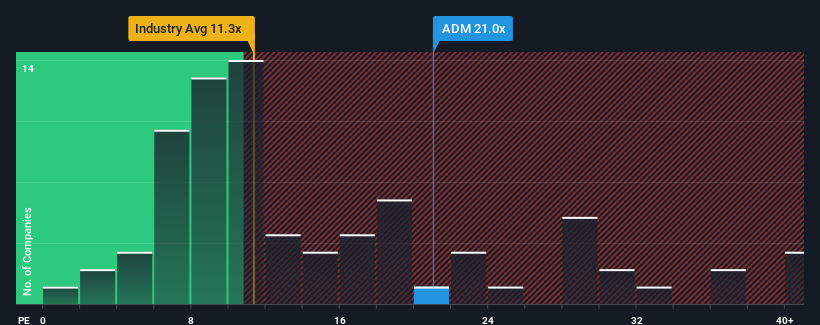With a price-to-earnings (or "P/E") ratio of 21x Admiral Group plc (LON:ADM) may be sending bearish signals at the moment, given that almost half of all companies in the United Kingdom have P/E ratios under 16x and even P/E's lower than 9x are not unusual. Nonetheless, we'd need to dig a little deeper to determine if there is a rational basis for the elevated P/E.
Recent times have been advantageous for Admiral Group as its earnings have been rising faster than most other companies. The P/E is probably high because investors think this strong earnings performance will continue. If not, then existing shareholders might be a little nervous about the viability of the share price.
Check out our latest analysis for Admiral Group

Is There Enough Growth For Admiral Group?
The only time you'd be truly comfortable seeing a P/E as high as Admiral Group's is when the company's growth is on track to outshine the market.
Retrospectively, the last year delivered an exceptional 42% gain to the company's bottom line. However, this wasn't enough as the latest three year period has seen a very unpleasant 40% drop in EPS in aggregate. Therefore, it's fair to say the earnings growth recently has been undesirable for the company.
Looking ahead now, EPS is anticipated to climb by 15% per annum during the coming three years according to the nine analysts following the company. With the market predicted to deliver 14% growth each year, the company is positioned for a comparable earnings result.
In light of this, it's curious that Admiral Group's P/E sits above the majority of other companies. Apparently many investors in the company are more bullish than analysts indicate and aren't willing to let go of their stock right now. Although, additional gains will be difficult to achieve as this level of earnings growth is likely to weigh down the share price eventually.
The Key Takeaway
While the price-to-earnings ratio shouldn't be the defining factor in whether you buy a stock or not, it's quite a capable barometer of earnings expectations.
We've established that Admiral Group currently trades on a higher than expected P/E since its forecast growth is only in line with the wider market. Right now we are uncomfortable with the relatively high share price as the predicted future earnings aren't likely to support such positive sentiment for long. Unless these conditions improve, it's challenging to accept these prices as being reasonable.
Having said that, be aware Admiral Group is showing 1 warning sign in our investment analysis, you should know about.
If P/E ratios interest you, you may wish to see this free collection of other companies with strong earnings growth and low P/E ratios.
New: Manage All Your Stock Portfolios in One Place
We've created the ultimate portfolio companion for stock investors, and it's free.
• Connect an unlimited number of Portfolios and see your total in one currency
• Be alerted to new Warning Signs or Risks via email or mobile
• Track the Fair Value of your stocks
Have feedback on this article? Concerned about the content? Get in touch with us directly. Alternatively, email editorial-team (at) simplywallst.com.
This article by Simply Wall St is general in nature. We provide commentary based on historical data and analyst forecasts only using an unbiased methodology and our articles are not intended to be financial advice. It does not constitute a recommendation to buy or sell any stock, and does not take account of your objectives, or your financial situation. We aim to bring you long-term focused analysis driven by fundamental data. Note that our analysis may not factor in the latest price-sensitive company announcements or qualitative material. Simply Wall St has no position in any stocks mentioned.
About LSE:ADM
Admiral Group
A financial services company, provides insurance and personal lending products in the United Kingdom, France, Italy, Spain, and the United States.
Good value with proven track record and pays a dividend.
Similar Companies
Market Insights
Community Narratives



